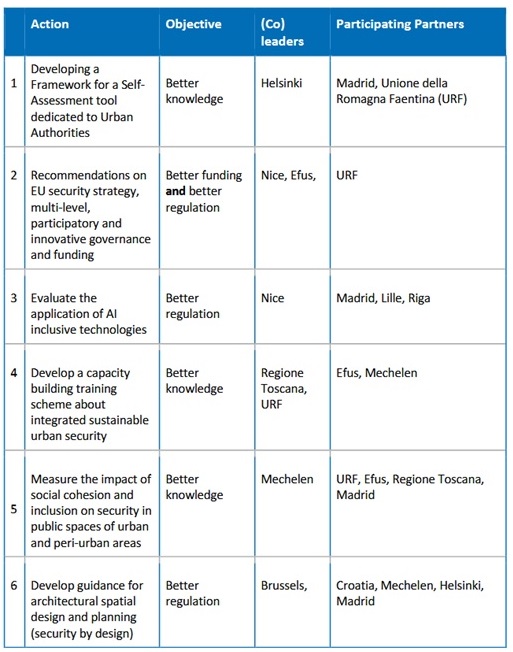Action Plan of the Urban Agenda Partnership on Security in Public Spaces

date: 04/12/2020
The Partnership on the Security of public spaces of the Urban Agenda for the European Union, which was set up in 2019 with the aim of strengthening the role of local and regional authorities in European urban security policies and is jointly coordinated by the City of Nice (France), the City of Madrid (Spain), and the European Forum for Urban Security (Efus), has published its Action Plan in November 2020.
Resulting from a collaborative process involving, besides the three co-coordinators, 10 partners including European cities and regions and national authorities as well as other participants such as the European Commission and the European Investment Bank (EIB), the Action Plan seeks to “propose actions that are useful to local and regional authorities, realistic, in line with the challenges of our time, easily understandable by citizens and bringing real European added value.”
Three priorities and six concrete actions
Under the broad objective of “providing concrete European responses to real needs identified at the local level, encouraging the exchange and dissemination of good and innovative practices and allowing better targeting of interventions as far as legislation or funding instruments are concerned,” the Partnership previously defined three priorities: urban planning and design to create safer cities; technology for smart, sustainable and safe cities; managing security and sharing public spaces in urban and peri-urban areas.
A practical roadmap for achieving those objectives, the Action Plan contemplates six actions, which correspond to the objectives of better regulation, better funding and better knowledge of the overall Urban Agenda for the EU:
- Developing a framework for a self-assessment tool that urban authorities can use to evaluate their local security context (better knowledge)
- Recommendations on the EU’s Security Strategy as well as on multi-level, participatory and innovative governance and funding (better funding and better regulation)
- Evaluating the application and inclusiveness of Artificial Intelligence (AI) technologies (better regulation)
- Developing a capacity-building training scheme for local and regional authorities and their local partners on the different aspects of the holistic, integrated and sustainable approach to urban security (better knowledge)
- Measuring the impact of social cohesion and inclusion on the security in public spaces in urban and peri-urban areas (better knowledge)
- Developing guidance for urban security through spatial design and planning (security by design) (better regulation).
The Partnership is now starting the implementation phase of the six actions and will seek to involve local and regional authorities besides those that are already associated with it. Their participation will be crucial to test and give feedback on the proposed actions in order to identify their strengths and weaknesses and eventually improve them.
*The Directors-General on Urban Matters (DGUM) are the central coordinating and decision-making body of the Urban Agenda for the EU. They convene once per presidency (i.e. twice a year). Among other responsibilities, they provide feedback to and ultimately endorsement of the Partnership’s Action Plans.

